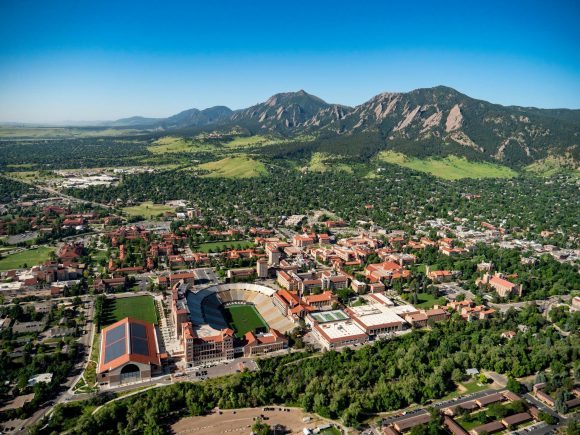
The CU Boulder Campus. (Photo courtesy of The University of Colorado Boulder)
Student mental health struggles were put front and center during the University of Colorado Boulder’s annual Health and Wellness Summit Thursday. Its keynote speaker, Dr. Roselinde H. Kaiser, broke down the science behind why students struggle with stress and anxiety and offered ways to approach mental health challenges. Kaiser is the director of the Research on Affective Disorders and Development (RADD) Lab and an assistant professor in the Department of Psychology and Neuroscience at CU Boulder.
“(In high school) how many of us knew how to balance our finances, juggle a schedule, set boundaries in a romantic relationship or do our own laundry?” Kaiser asked the audience. “But we expect college students to know how to do all of these things and more from the moment they step foot on campus.”
These new experiences present challenges, said Kaiser, especially since many students’ brains are still developing when they first start college. Kaiser said that in the last fiscal year, CU Boulder’s mental health and wellness programs saw over 52,000 visits, with depression and anxiety being the most common reasons for seeking support.
According to Kaiser, Colorado has one of the highest rates of depression and suicide nationwide.
“Colorado is a top 10 state, on lots of top 10 lists,” Kaiser said. “It’s not the case that young people are just emotional snowflakes these days, ready to label the slightest discomfort depression. Young people are in pain, and that pain is more severe and more common than ever before.”
This led her to ask the question, “What is it about the college years that may make this such an important window of risk for mental health challenges?”
She went on to explain that from the ages of 18 to one’s late 20s, cognitive systems undergo development during which there is a reorganization of brain networks.
According to Kaiser, these networks are essentially different parts of the brain communicating with one another, which in younger brains is akin to parts of the brain communicating with its neighbors or “domestically,” while as cognitive systems develop, it is more “global.” And as brains form a more global link, this helps with one’s ability for what she calls self-regulation or “how well one copes with the good and bad things happening in their life.”
“Although 18-year-old brains are undeniably better at self-regulating than 13-year-old brains, critical functional brain networks are still coming online,” Kaiser said. “Unusual or especially intense stress events that occur in the college years may have bigger and more lasting impacts on mental health than if the same kinds of events occurred later in adulthood.”
Kaiser explained that as we get older, our ability to self regulate improves, although not at the same rate for everyone. Much of her research focuses on how different sensitivities to stress shape the kinds of mental health problems that one is vulnerable to.
Kaiser ended her talk by promoting the Peer Wellness Coaching program, a free CU Boulder service offered to students living in residence halls and Bear Creek apartments.
“Yes, CU students now are confronting higher rates of stress, anxiety and depression than ever before,” Kaiser said. “But you in this generation of CU students are more connected than ever before and more empowered to advocate for yourselves and for your peers. You are pushing for discovery, for bridges between science and wellbeing.”
“We are eager to discover with you.”
Contact CU Independent Breaking News Editor Noelle Videon at noelle.videon@colorado.edu.
